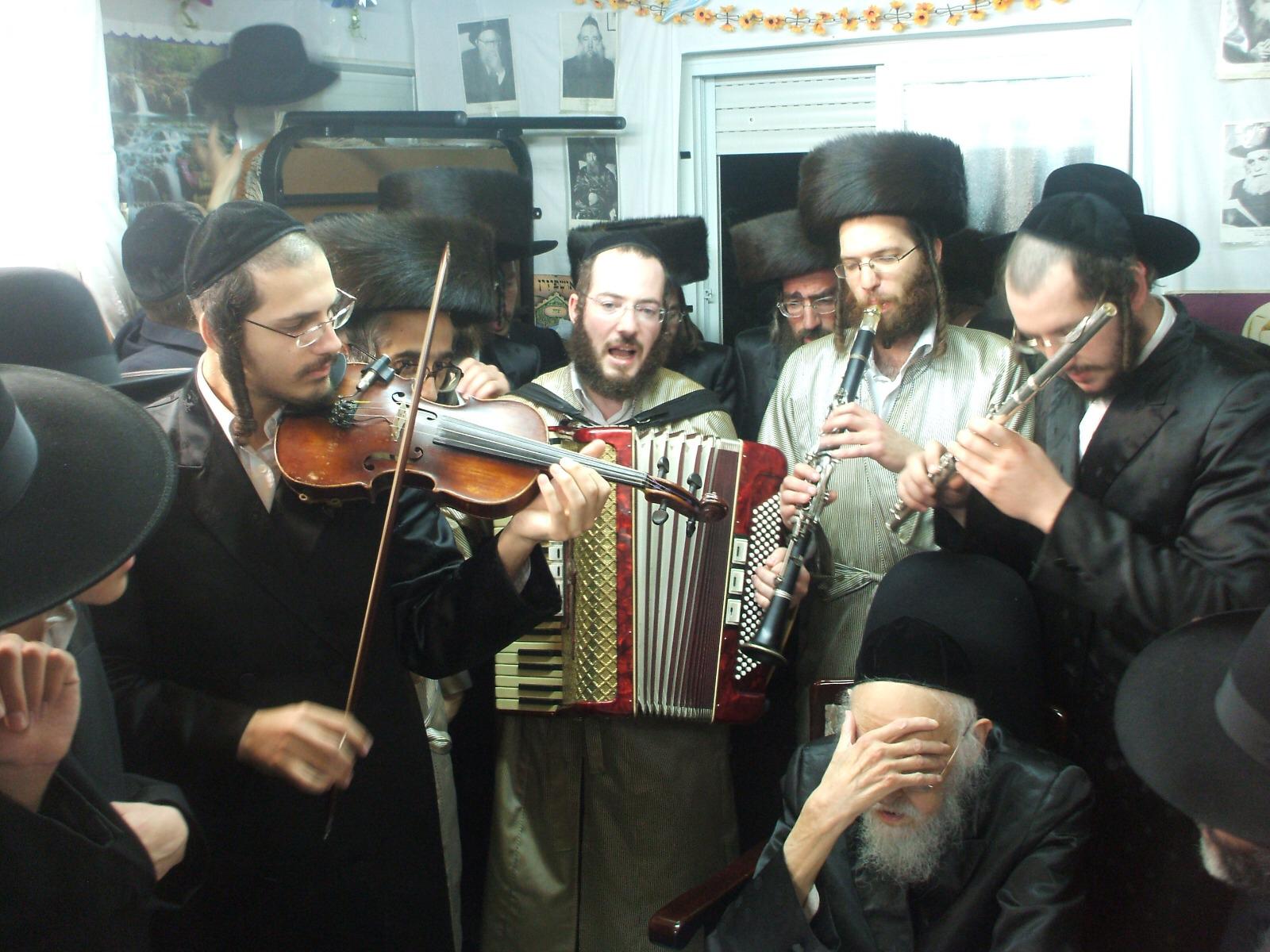Clarinet Player: "I Was Injured on the Way, But Didn't Give Up Playing in Meron"
Clarinetist Chilik Frank talks about his first performance at Lag B'Omer in Meron as a 17-year-old, his new single for the celebration, and a family car accident he experienced after leaving Meron.
 Clarinetist Chilik Frank
Clarinetist Chilik Frank"My first performance in Meron happened without any prior preparation on my part," says renowned clarinetist Chilik Frank. "I was standing beside my friends when I suddenly heard one of the singers announce over the microphone: 'Chilik Frank, to the stage,' and from that year onwards, I have had the honor of bringing joy to those who visit the site annually.
"The person who called me to the stage on that unforgettable Lag B'Omer," continues the clarinetist, who has since become synonymous with the central celebration in Meron, "was someone from the Meron orchestra who knew me and asked to also add a clarinet player to the orchestra. I was only 17 then, and naturally, I was very shy and refused to go on stage, but after my friends urged me and quoted the well-known phrase: 'In a place where there is no man, strive to be a man,' I decided to go up and play. Even after making the decision and starting to play, I felt a great fear. Only after about half an hour of continuous playing did I begin to get used to standing and bringing joy to Jews, and I gained courage. You could say that without that event, I wouldn't be where I am today," he notes.
In the year Frank first performed in Meron, the music stage there looked completely different than how we know it today. "I was called to play then simply because there weren't enough musicians to stand there, as odd as it sounds today with the influx of musicians asking just to have a short time to sing or play. You have to understand that today the policy is different: everything is more organized, and there is a procedure that every musician or singer who wants to bring joy to those visiting the site has to go through. Back then, the demand wasn't so high, and thus there was no procedure. So if someone decided to invite me, I could go on stage and sing without any interruption."
"Even as a Child, I Was Enchanted by Meron Tunes"
Chilik Frank's career is closely intertwined with the history of the Lag B'Omer celebration of Rabbi Shimon bar Yochai in Meron. Frank, now 42, used to go up to Meron as a young boy. "My father would take me every year on the anniversary day to the holy site, and when we arrived, I would listen longingly to the tunes of Meron that played there. In those years, the Lag B'Omer ceremony in Meron was very different from how it is today. The music was more limited, the number of lighting ceremonies was smaller, and even the number of participants was less."
The orchestra that played in Meron about two and a half decades ago, Frank describes as "especially modest." "There was one organ and two speakers only, which operated throughout the entire lighting ceremony of Bayan, and immediately after that, they would stop, and then the music in the yard would start. At 2:00 AM, the live music ended until the evening after Lag B'Omer. Those who don't remember those days would find it hard to believe what I say, but this was the reality. Throughout the day, they would play a tape with Meron songs, and that was it. Those days have long passed. As someone who follows Lag B'Omer closely every year, I can tell you it's a blessed change, and so many Jews want to come and identify with this great day, both to pray at the site and to bring joy to participants from all corners of the country."

Even while still a young boy, Frank decided to formally study the art of music playing. "Because I was so impressed by the events in Meron, I decided to become someone who brings joy to Jews through music. Shortly after I made the decision, I found an old clarinet at my uncle's house and went to learn how to play it. I went to the best teachers in the field at that time. I studied with Roman Konzman, a notable musician and baal teshuva, and also took lessons from Musa Berlin of Meron. Then I started performing in the evenings at various events. At that time, there were almost no events that included a clarinet. I was the 'Nachshon.' Then came my first performance in Meron, as a 17-year-old, which launched me onto the forefront. After that performance, I felt ready to perform across the country."
Since his first appearance at Meron, much water has passed through the nearby Meron stream, and Chilik has since become an integral part of the anniversary celebrations at Rabbi Shimon bar Yochai's site, with his performances becoming legendary. In recent years, Frank performs at two separate stages: first, he plays on the 'central stage' for two hours, and then in the evening, he appears at the traditional lighting ceremony of the Toldot Aharon Hasidic sect, which symbolizes the end of the great day.
Is there a difference between your performances in Meron in past years compared to now?
"The significant difference is that in the past, I felt a great sense of responsibility because I knew that if I stopped playing, there would be no one to replace me. I would stand on the stage and play for long hours. In those years, there were only a few others besides me who played at the site, so I couldn't afford to stop playing, even if I felt I no longer had the strength. In contrast, nowadays, I play only for two hours and can relax knowing that another musician will replace me immediately after I finish.
"Unlike the past, even if I wanted to, I couldn't continue to play unless I had arranged it in advance with those in charge, after changes were made to the stage management in recent years. Today, every orchestra has a set time; otherwise, it would be chaotic. There are also musicians and singers who have been performing for many years, like Musa Berlin, who has appeared in Meron for consecutive decades, and they are given almost uninterrupted time to play."
Outside of Meron, Frank has also become a well-known name in the Hasidic music industry. He attributes a significant part of his breakthrough to the albums he has released. "I released one album and noticed there was a demand, so I decided to release another album, which also, by the grace of Hashem, received a good response. I then released more albums, the majority of which were very successful. In total, I've released nearly twenty albums, some of which sold tens of thousands of copies. One of my albums, which includes Purim tunes, sold 24,000 copies within a month and a half. Nowadays, besides albums, I also perform artistic shows."

One can't help but ask – how did COVID-19 affect you? Did the performances pause during this time?
"The recent period was particularly difficult for those involved in music. There was almost no work in the field. For me, it was a hard financial blow. However, these are the small troubles of COVID-19," he says. Nevertheless, he notes that even under normal circumstances, it is a very individual field, "It's not like you receive a monthly salary or can predict the demand that will be during the month."
A Public Servant for the People of Israel
Not long ago, Chilik released an impressive clip ahead of Lag B'Omer, yet he didn't anticipate what it would lead to. On the way back from the filming in Meron, the jeep he was traveling in with his family slid. "By the grace of Hashem, we came out of it as a miracle," he says, "Apart from minor bruises, we weren't significantly injured. Although it was a frightening event, the children were in real trauma, but they recovered quickly with heavenly grace."
At that time, when the clip was filmed, Chilik was sure that for the first time in many years, he wouldn't be able to be in Meron on the anniversary day. "It was very disheartening to think about it," he says. "I'm used to going to the site every year on Lag B'Omer, during which I get to bring joy to Jews, and it was disappointing to think that I wouldn't be able to participate this year in the events in Meron. But then came the announcement that informed me I was likely invited with a small group of musicians to perform at the central event in Meron, which was held more restrictedly this year. I promise to be a public representative for all of Israel, who this year doesn't have the opportunity to come in large numbers to the site."
Indeed, shortly after we had spoken, it was revealed that at the initiative of Minister Rabbi Aryeh Deri, a 'central joy stage' would be set up in Meron, where several leading musicians, including Chilik Frank, would appear. However, even before he received the final answer, Frank clarifies in our conversation, that even if he won't manage to make it to the site, it's important to understand that "Rabbi Shimon is for everyone, and even if you are at a distance, you can still receive the influences of this great day." This message is undoubtedly important for each one of us, who this year will not be able to reach the holy site in Meron.

